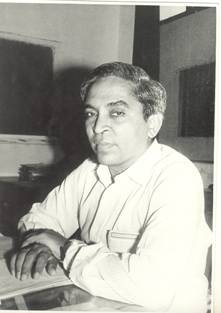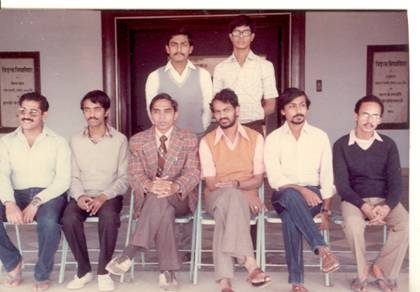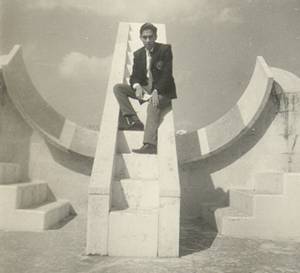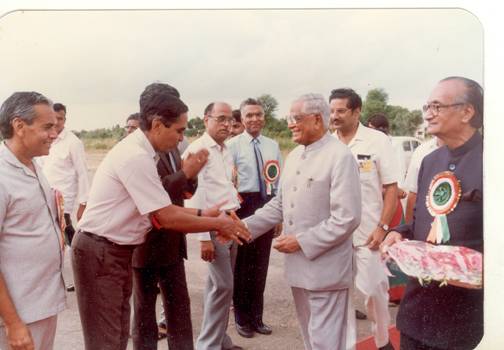 |
||
|
|
|
||||||||||
|
||||||||||
|
bitsaa.org BITS Pilani |
With Divya Diwakaran (Current
Student) An Afternoon with BITS
Pilani’s New Director Dr. LK Maheshwari talks about the last
30 years at BITS, his vision of the future, the introduction of the
color TV to Pilani, research, admissions and much more in this candid
interview. |
Shall
we start right from the beginning sir? Tell us something about your life. When
did you first come to BITS?
I came to BITS
in 1965 for studying in a MSc (Tech) Electronics program which was a 2 year
program which I completed in 1967 and then I joined the PhD program in BITS
which went up to June 1971 and since July 1971 I’m in the faculty of BITS.
 So what made you stay here all these years?
So what made you stay here all these years?
Well, the
environment of Pilani, the affection of the students and the system of
education followed here in BITS, all these contributed to my staying here. On
the way I did have other opportunities including one by our Chairman to be the
CEO of their sugar industries in UP. I declined it however, because I thought
that environment would not suit me and continued to stay on here.
30
years has been a really long time. You must have held a variety of positions
here?
Well, I
started of as a Lecturer here in 1971. In 1973 when the Instrumentation
program came into being I was called upon by the then Director, Dr. Mitra to
take the lead. At the time it was a program with EEE. Later when restructuring
took place in 1976 and Instrumentation got formed as a separate unit I was
appointed Chief of Instrumentation.
So this is the
story, but it is teaching that I have always like most, the opportunity of
interaction with students and this is has given me great strength.
What
made you choose teaching as a career? After having graduated in Electronics
way back in 1971, there might have been ample opportunities then?
To be very
frank, I really had never planned for this. I came from a middle class family
and my father always wished that I go in for higher studies. So I took up the
MSc. program here. Upon completing it I was offered a research fellowship. I
completed my PhD as a full time student with a stipend of Rs.400 a month, I
was one of the first full time research fellows in the Engineering faculty at
that time. After getting the PhD I was given an offer to be part of the
faculty at REC, Trichy. However I was asked by the Head of the Department as
to why should I not join in here itself. They offered me a position as
Lecturer with the same basic as Trichy was offering, so I joined here. So if
you see it is really the circumstances that put me into teaching.
But after
having joined teaching, I found it a very noble profession. As a teacher you
have to keep higher goals of motivating young minds which I feel I have been
successful at to a certain extent, I do not know for sure. The satisfaction of
seeing bright young faces, I think no amount of money can match and I have
been particularly fortunate in receiving this affection and appreciation from
the students.
I have always
believed that I should go as an equal. I don’t want to go to any place where
I’m not respected for the purpose I go for. So when opportunities came by, I
went. In 1999 I visited, on behalf of the Institute, some of the Laboratories
and Institutes abroad for collaborations with us which I though was a
respectable situation. I have had the opportunity of meeting several
professionals, administrators and I feel they have respect for us now. When I
respect myself, I earn it from others.
Also I never
tried to go abroad for any studies, having completed my PhD here. But my
papers and my contributions to the field- it was Bipolar Junction Transistors
at the time were appreciated and I did receive some invitations to work there
but it just so happened that I continued to stay here.
Moving
away slightly…., any particularly memorable moments in BITS that you
recollect?
Memorable
moments… one of them was when I was given the responsibility to be the
In-charge of the Instrumentation group. I must have been around 30-31 then and
in those days giving such important responsibilities to young people was
unheard of. So that was exciting, not because I got a position but because I
was given the opportunity to work and show something and trust was placed in
me to fulfill the requirements of the job.
Another
memorable moment would be when I was awarded my PhD. PhD is a process shrouded
with uncertainties regarding its completion. Looking back now it seems like a
simple affair but back then it was a big moment.
Then another
one I recollect is during the ASIAD, 1982. We had no television in Pilani at
that point of time and I being In-charge of Instrumentation was given the task
of telecasting live ASIAD in Pilani and in ‘color’. It was the first time
color television was introduced in the country. There was a lot of
experimentation involved, putting antennas on the roof of ET (Engineering
Theatre) and other places and the moment we received the signal I could see
the uncontainable excitement among all the students, everyone jumping,
completely thrilled with what they saw. We had about 2-3 TVs, a Sony TV one of
the students had bought as part of his project. The programs were
aired in rooms- M31-M33 (currently 2215-2217 I think), we put daris on the
floor and this continued throughout the ASIAD week. It was very exciting for
me as project in-charge along with Prof Raghunathan and is one of those
particularly memorable moments.
I
can only imagine. Today some transition of that magnitude is difficult to
perceive. Getting Internet connection in our rooms was big but I guess not so
much as this one was back then. What do you think are the biggest challenges
facing BITS today?
The biggest
challenge would be to come at the top of the education system. At BITS, we
have constantly strived to experiment and make improvements and have been
quite successful.
Other
challenges would include:
1. To have
research linkages with the industry. We currently have educational linkages in
terms of
 2.
As a technological university we have to develop entrepreneurship through
technologically driven projects. This development needs to take place in BITS
through the promotion of entrepreneurship among students. According to me this
is what will be the salvation for the country. For, every person who decides
to become an entrepreneur will in turn generate at least 10 more jobs thus
increasing employment opportunities.
2.
As a technological university we have to develop entrepreneurship through
technologically driven projects. This development needs to take place in BITS
through the promotion of entrepreneurship among students. According to me this
is what will be the salvation for the country. For, every person who decides
to become an entrepreneur will in turn generate at least 10 more jobs thus
increasing employment opportunities.
3. Another
challenge is to fulfill social aspirations. As a university we cannot sit in
‘ivory towers’. We need to be aware of societal needs and take up some
social responsibilities. Let me give you an e.g. Water is a crucial problem in
4. Another
issue is whether we can do something to remove illiteracy in the country. Our
contribution could be in terms of developing low cost lessons, technologies
that can be used by many at large. It should be made a mission.
5. Also I see
it as a challenge to be able to inculcate habits among young students and the
faculty as well to be conscious of their social responsibilities. The feelings
of the need to serve the community need to exist in their minds. Only then can
we dream of a prosperous
These are I
think the main challenges we face. We need to be a knowledge society. Every
BITSian has to be able to prove that he can be a leader be it in technology,
politics, administration whatever, but with a mission in mind- that
But
currently there isn’t much of a research focus in BITS. Is anything being
done in that regard?
Well, I can
tell you that some efforts have been made. I was very happy to see some of the
exhibits during APOGEE (the Academic fest) where some reliable projects in
rural development areas in terms of devices for sowing seeds, low cost energy
devices were displayed. There are pockets; we need to learn how to develop
such ideas to make them feasible and useful. The seeds are there but we need
to take it to a stage where we can convert it into a product and give it a
technical name. We have a long way to go. We are proceeding in the right
direction; however a bigger thrust is needed.
There is the
Technology Incubation Centre (TIC), NEN projects, rainwater harvesting
projects and others. What we need now is to work on them, develop them and see
that they are economically viable and achieved in a set time frame- to get
into a mission mode. Once appropriate missions are set, we can achieve them.
 Now that you are the Director of BITS,
Pilani, what are your visions for BITS?
Now that you are the Director of BITS,
Pilani, what are your visions for BITS?
My vision is
to bring a sense of pride among all students and faculty of the institute, to
make them feel they are part of a family- a family which means business, which
means excellence. Also, of course, our vision is clearly put down in the
bulletin in the words of our founder chairman, I quote, “to provide for and
otherwise protect education and research in the fields of Technology, Science,
Humanities, Industry, Business and Public Administration and to collate and
disseminate in such fields effective ideas, methods, techniques and
information as are likely to promote the material and industrial welfare of
India” and to “train young men and women able and eager to create and put
into action such ideas, methods , techniques and information”. This was the
vision of the great legendary Shri G.D. Birla. This remains to be our vision
and I think it is up to the individuals now to take it upon themselves to work
towards fulfilling this vision.
Like I said
earlier, the need now is to set small missions to be achieved in a set time
frame. I would like to see Pilani take the lead and set examples in terms of
achieving developmental goals. Pilani should be known for something, for e.g.
it could be for the development of good educational material. A large number
of engineering colleges in the country today do not have very high standards
of education due to lack of good teachers and other factors. We could put in
some efforts in the area to produce fruitful results. With the objectives in
place, let there be entrepreneurs who will take up the task. We have CEL
(Centre for Entrepreneurial Leadership) here with a group of individuals
highly committed to the development of entrepreneurship who will be able to
guide them and provide assistance and the Institute will provide full support
for such endeavors.
What
about the BITS, Alumni? What are your views on the changes in the level of
BITS, Alumni interaction with Institute over the last 25 years?
The Alumni
have become much more active now and it is a positive sign for the Institute.
What has become very satisfying is that they have reconnected with the
Institute emotionally too. Of course, earlier too they have been there but now
I think they have come together as a group. For e.g. the BITSConnect project
has become more that just a project now, it’s become a sort of mission to
connect with BITS. From different parts of the world they are coming together
for any cause and this has been particularly satisfying.
How
do you see their role in the development of BITS, Pilani?
Well, the
Alumni have shown a lot of interest in our projects. BITSConnect has been one
of them. They have shown eager interest in other projects too in terms of
entrepreneurship development. They have shown active participation in projects
of societal importance like drip irrigation, drinking water for Rajasthan etc.
At Nokia, they have helped establish scholarships. It is the Alumni that are
active in all these projects and I know they will continue to be actively
involved.
But more than
that, I think what is also required now is that they spend time, a sabbatical
in Pilani. If the Alumni can come for a period of 3-4 months here then they
will become active partners and that’s when it’ll serve the BITS community
more. What I seek from the Alumni is their commitment to spend time, starting
from say 15 days to a month, a few months up to a year even and contribute to
the academic growth of the Institute in special areas- society projects,
research projects or any other area of their interest and the Institute will
be happy to appropriately compensate them and provide them with necessary
facilities during their stay here. So this is an appeal to the Alumni, to
spend some of their time here in taking up courses, research projects and
entrepreneurship activities. We would like to create the same culture of
opportunity here like it exists outside, like in the
There
has been a lot of talk about the process of admissions into BITS at the
undergraduate level, doubts regarding whether the existing process is really
the best one to ensure we are drawing the best talents from all parts of the
country. Are there any plans to change the same?
Right now our
admission procedure is under discussion in the courts and we are currently
defending it. I am not saying that what we have currently is the best, but
what we have is a process, a process that gives us students who have a
normalized percentage greater than 98%. The
process can be altered. But what is required is a national testing scheme
which we have suggested to the government, where students have the opportunity
to improve their scores and this score obtained can be used by them to apply
all universities in the country, something on the lines of the GRE and then
the Institution should be allowed to finally select its students. What the
government insists today is that it will conduct an All-India test and counsel
the students and send them to us, which is not acceptable to the Institute. We
have a system, which we are proud of and any system chosen has to be such that
it maintains the autonomy of the Institutes. This is the fundamental issue
towards which we are working.
Is
there going to be any significant changes in the admission process for the
next academic year?
Right now we
are making marginal changes. For e.g. for students from the CBSE syllabus we
might take them separately from different zones, normalizing their marks with
that of the zone’s topper. Similarly for
Going
back to the talk on teaching as a career what do you have to say to the
current generation to take it up?
Society
develops a norm about what a developed person or a developed society is. In
our society unfortunately there is not much importance given to teaching,
which is why not many are attracted to it. But if you look at say countries
like
Is
BITS doing something to attract good faculty? Like you said earlier, you were
offered the chance and then it got you interested. Are such things happening
even now?
What we
normally do is we place an open advertisement in leading newspapers both for
in house students as well as outsiders. Then we have a very innovative
recruitment method where if required we call the applicants to deliver a
lecture here in Pilani. The recruitment committee consisting of all Deans
listens to them and then if found suitable we offer them a post right up to
Professor right across the table. There is no need to wait for approval or
sanction from any other committees.
We also
conduct Intensive Teaching Workshops with about 20-30 teachers enrolled in it
every semester, where the art of teaching is taught. In selective areas we
conduct subject workshops as well, providing opportunities of discussions in
upcoming topics in the field. Opportunities to attend conferences are also
given. We have now also provided a special contingency fund to the entire
teaching faculty, Rs.6000 for Professors and Associate professors, Rs.5000 for
Lecturers and Assistant lecturers and Rs.2000 for the Teaching assistants for
their own professional activities. They can use it to purchase books,
stationery, subscription to journals etc.
We
now have a new campus at
BITS,
BITS,
 The
aim is to develop a township there like here in Pilani. The significant thing
is that it will be a full fledged campus like BITS, Pilani unlike the many
engineering colleges in the country which are built at a budget of about 3-4
crores. We have been receiving a lot of support from the Education Ministry in
The
aim is to develop a township there like here in Pilani. The significant thing
is that it will be a full fledged campus like BITS, Pilani unlike the many
engineering colleges in the country which are built at a budget of about 3-4
crores. We have been receiving a lot of support from the Education Ministry in
IITs have some
strengths in their own areas because they have developed well. We are
certainly proud of the IITs as a nation. Their resources essentially come from
the governmental side. Also since their faculty have been involved in a lot of
active research projects right from the beginning they have an edge over us in
terms of attracting industrial projects and industrial funding. On the other
hand on the education front, in classroom teaching BITS remains ahead. In the
methods of documentation, the flexibilities in course structure, the elaborate
planning of instruction, registration, counseling, which are highly structured
in BITS. The concept of
A challenge
for BITS will be to take on competition from the world’s best universities
now because education is going to be created as a service by 2005 under the
agreement of GATS of which India is a member which essentially means that if
any foreign university, say Stanford, MIT etc. wants to set up a campus here
in India they can. A fundamental goal of BITS would be to attract best
students and faculty to take the journey on.
Well, that’s
really their methods, the magazines need to publicize themselves and also
inform the society. It’s a sign of good journalism to inform the society
what’s best. They have their own means and data by which they come to such
conclusions. So if we are good and among the best, it will be published.
Now we have to see that each student, each faculty member, each person
who is responsible for any activity in the BITS system works towards being the
best in all aspects and take the initiative for the same. You need to see what
you can do to give back something to BITS. When I teach, I need to teach the
best, if I’m a student I need to study well and this is what will bring most
satisfaction.
Thank
you so much sir, for your time and patience. It has been really wonderful
talking to you.
Thank you. I
wish all the students the very best and that they do well in whatever career
path they choose and belong to that great community of BITSians. ■
(c) Copyright 2003 BITSAA International Inc.

